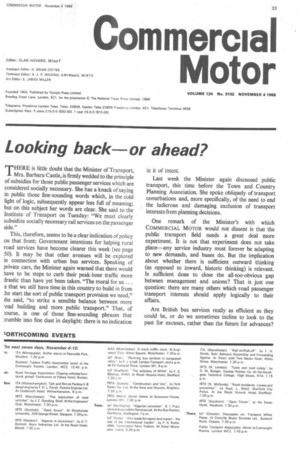Looking back or ahead?
Page 35

If you've noticed an error in this article please click here to report it so we can fix it.
THERE is little doubt that the Minister of Transport, 1 Mrs. Barbara Castle, is firmly wedded to the principle of subsidies for those public passenger services which are considered socially necessary. She has a knack of saying in public those fine-sounding words which, in the cold light of logic, subsequently appear less full of meaning; but on this subject her words are clear. She said to the Institute of Transport on Tuesday: "We must clearly subsidize socially necessary rail services on the passenger side."
This, therefore, seems to be a clear indication of policy on that front; Government intentions for helping rural road services have become clearer this week (see page 50). It may be that other avenues will be explored in connection with urban bus services. Speaking of private cars, the Minister again warned that there would have to be steps to curb their peak-hour traffic more drastic than have yet been taken. "The moral for us . . . S that we still have time in this country to build in from he start the sort of public transport provision we need," the said, "to strike a sensible balance between more road building and more public transport." That, of :.ourse, is one of those fine-sounding phrases that :rumble into fine dust in daylight: there is no indication in it of intent.
Last week the Minister again discussed public transport, this time before the Town and Country Planning Association. She spoke obliquely of transport conurbations and, more specifically, of the need to end the ludicrous and damaging exclusion of transport interests from planning decisions.
One remark of the Minister's with which COMMERCIAL MOTOR would not dissent is that the public transport field needs a great deal more experiment. It is not that experiment does not take place—any service industry must forever be adapting to new demands, and buses do. But the implication about whether there is sufficient outward thinking (as opposed to inward, historic thinking) is relevant. Is sufficient done to close the all-too-obvious gap between management and unions? That is just one question: there are many others which road passenger transport interests should apply logically to their affairs.
Are British bus services really as efficient as they could be, or do we sometimes incline to look to the past for excuses, rather than the future for advances?








































































































































































